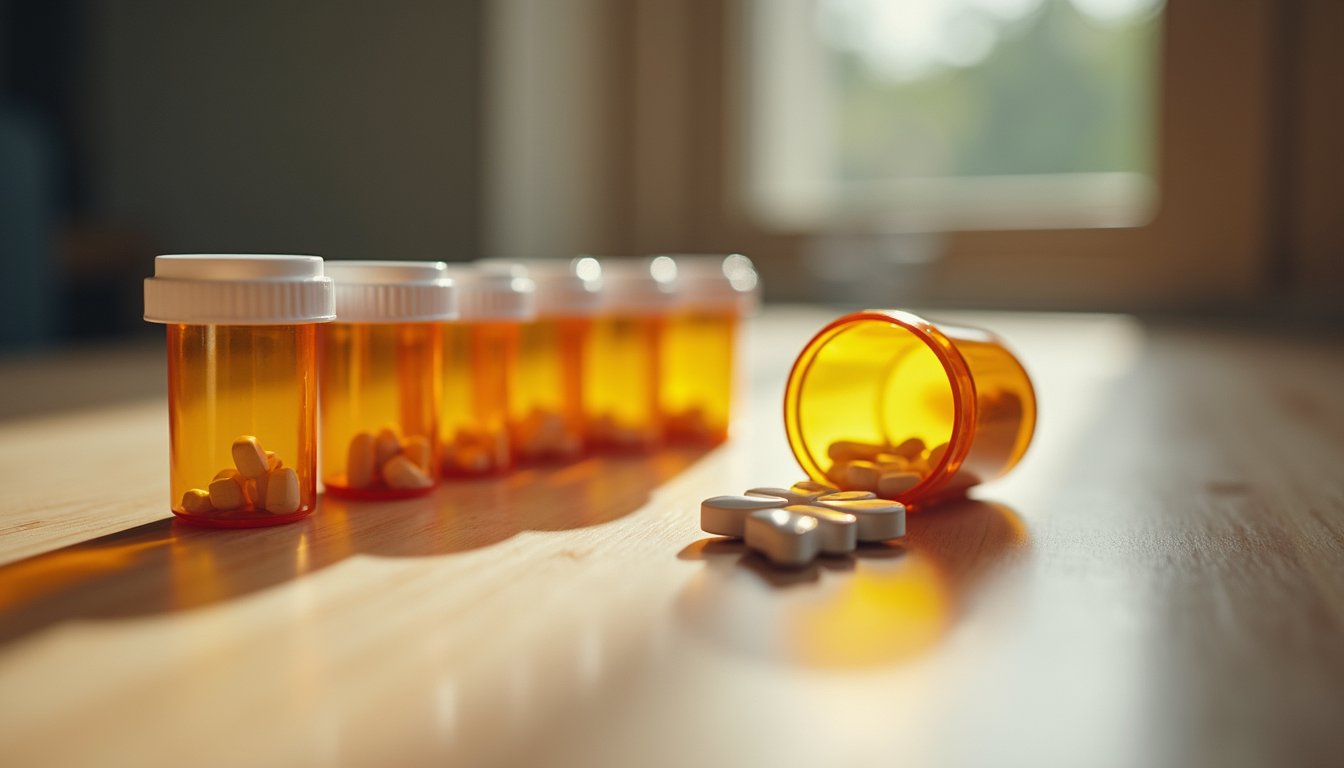Modern depression treatments can cause several significant side effects you should monitor. Common issues include memory and concentration problems (affecting about 50% of patients), sexual dysfunction (56%), and weight changes (55%). You’ll likely experience sleep disruptions, with up to 90% of patients reporting insomnia or drowsiness. Physical symptoms may include nausea, dizziness, and gastrointestinal changes. Understanding these potential effects helps you make informed decisions about your treatment journey.
Understanding Modern Antidepressant Side Effects

While modern antidepressants have revolutionized mental health treatment, they carry a considerable burden of side effects that can impact patient well-being and treatment adherence. You’ll find that side effect variability differs among medications, with escitalopram causing more headaches and pruritus, while sertraline affects appetite. Studies show that 70 to 80 percent of patients can achieve significant symptom reduction with proper treatment selection and management. Gastrointestinal issues like flatulence and nausea are particularly prevalent among SSRI users.
The most common challenges you might face include memory impairment (51%), decreased concentration (50%), and somnolence (59%). Sexual dysfunction affects 56% of patients, often persisting long-term. Sleep disturbances manifest as both insomnia and excessive drowsiness, greatly impacting daily function. Treatment adherence often suffers due to these effects, with many patients discontinuing medication when side effects become unbearable. Long-term cardiac risks increase by 56% after 1-5 years of use, doubling beyond six years. Younger patients between ages 30-39 face threefold higher risk of sudden cardiac death with antidepressant use lasting 1-5 years.
Physical Symptoms and Body Changes
When starting antidepressant treatments, you’ll need to monitor changes in your weight and appetite patterns, as these medications can affect your metabolism and eating habits. Physical discomfort may manifest through symptoms like joint pain, muscle tension, or general body aches that weren’t present before treatment. Your healthcare provider will work with you to assess these physical changes and adjust your treatment plan accordingly, ensuring the benefits of your medication outweigh any side effects. Regular checkups are essential since untreated depression can lead to worsening health complications over time. Self-help and coping methods like regular exercise and a healthy diet can help minimize treatment-related physical symptoms while supporting overall recovery. Engaging in at least 150 minutes of moderate aerobic activity weekly can significantly improve both physical symptoms and mental well-being.
Weight Management Challenges
Although weight changes affect most people taking antidepressants, the patterns and severity vary greatly among medications and individuals. You’ll find weight gain patterns differ markedly across medication classes, with SSRIs showing the most consistent increases over time. Recent research indicates repeated antidepressant use doubles the risk of developing obesity in non-obese individuals. While 55% of patients experience weight changes, your risk depends on factors like medication choice and treatment duration. Non-drug treatments like cognitive behavioral therapy may provide effective alternatives for those concerned about medication-related weight changes. Recent studies show that 38% of users report experiencing various side effects from SSRI medications.
| Medication | 6-Month Change | 24-Month Change |
|---|---|---|
| Sertraline | +0.5 lbs | +3.2 lbs |
| Escitalopram | +1.4 lbs | +3.6 lbs |
| Paroxetine | +1.4 lbs | +2.9 lbs |
| Bupropion | -0.25 lbs | +1.2 lbs |
Your weight management journey may be influenced by your depression recovery, as improved appetite often accompanies successful treatment. If weight gain concerns you, medications like bupropion or fluoxetine typically carry lower risks for notable weight changes.
Physical Discomfort Overview
Most antidepressant medications cause physical discomfort during the initial weeks of treatment, with symptoms typically subsiding as your body adjusts to the chemical changes. You’ll likely experience various physical symptoms and body changes as your system adapts to the medication’s effects. These changes can affect multiple bodily systems and may require ongoing communication with your healthcare provider. Exercise-based treatments like walking or jogging have shown significant benefits with fewer physical side effects compared to medications. You might notice medication-induced symptoms like nausea, dizziness, breast tenderness, and muscle pain during the initial adjustment period. Neurological effects often include feelings of disconnection, spinning sensations, and changes in sensory perception. Some patients using newer treatments like SPRAVATO may experience sedation and dissociation requiring monitoring by healthcare professionals. You’ll possibly experience gastrointestinal issues such as nausea and vomiting, which typically improve within the first few weeks. Physical symptoms can vary in intensity throughout the day, with some people experiencing heightened discomfort shortly after taking their medication.
Mental and Emotional Responses

Depression treatments can trigger a range of mental and emotional responses that affect how you perceive and interact with your surroundings. You might experience dissociative symptoms, including feeling disconnected from yourself or your environment, accompanied by decreased sensory awareness and spatial disorientation. The combination of medication and psychotherapy has shown better effectiveness in managing these side effects. Recent clinical studies reveal that nasal spray treatments are becoming a viable first-line monotherapy option for resistant cases.
Emotional dysregulation commonly manifests as unexpected mood shifts, ranging from heightened anxiety to paradoxical euphoria. You’ll notice changes in how you process sensory information, with some patients reporting dizziness that impacts cognitive function and altered body awareness. These effects can create a temporary state similar to intoxication, even without alcohol consumption. Since severe depressive episodes can significantly impact daily functioning, these side effects may be considered manageable trade-offs for long-term improvement.
Be prepared for fluctuating emotional responses that may seem uncharacteristic, such as sudden excitement or anxiety without clear triggers. These symptoms typically occur alongside changes in motivation levels and concentration ability.
Managing Sexual Function Changes
While antidepressant medications effectively treat mood disorders, they often trigger significant changes in sexual function that can impact your quality of life. Understanding and actively managing these changes through communication strategies and partner support is essential for maintaining both your mental health treatment and intimate relationships. Stress and cortisol can further compound sexual side effects by restricting blood flow. Low neurotransmitter levels in the brain can significantly reduce the ability to experience sexual pleasure and arousal.
- You’ll find that SSRIs commonly cause delayed orgasm, reduced libido, and erectile difficulties, but alternative medications like Wellbutrin and Mirtazapine typically have fewer sexual side effects.
- Regular sexual activity may help minimize SSRI-related dysfunction, as research shows inactivity can worsen symptoms.
- Working with your healthcare provider to adjust dosages or switch medications can effectively address sexual side effects.
- Adding supplemental treatments or considering newer antidepressants like Gepirone-ER might help balance your mental health needs while preserving sexual function.
Sleep Pattern Disruptions

You’ll likely experience either insomnia or excessive drowsiness as your body adjusts to antidepressant medications, with these disruptions varying based on the specific treatment type. Your sleep-wake cycles may become irregular during the initial weeks of treatment, potentially affecting your daily routines and energy levels. Taking your medication at consistent times each day, especially for options with sedating effects, can help minimize sleep-related side effects and optimize your treatment response.
Insomnia Vs Excessive Drowsiness
Sleep pattern disruptions represent one of the most challenging paradoxes in depression treatment, as medications can trigger either insomnia or excessive drowsiness in patients. You’ll notice that certain antidepressants like reboxetine tend to cause insomnia triggers, while others like trazodone lead to significant drowsiness management challenges.
- If you’re experiencing insomnia, you’re not alone; up to 90% of depression patients face sleep difficulties, which can impact treatment success
- Your medication’s impact on sleep varies by dosage, with some drugs showing complex response patterns
- You’ll need careful monitoring if drowsiness occurs, as it affects 50% of depression cases
- Your risk of suicidal behaviors may increase with persistent insomnia, making it essential to report sleep changes to your healthcare provider
Irregular Sleep-Wake Cycles
Managing irregular sleep-wake cycles presents a complex challenge during depression treatment, as various interventions can greatly impact your circadian rhythms. Your sleep phase may shift unexpectedly when using antidepressants, particularly SSRIs and SNRIs, which can fragment sleep architecture and alter REM patterns. Light therapy, while effective for seasonal depression, might disrupt your circadian alignment if not properly timed with your natural sleep-wake schedule.
Treatment approaches like therapeutic sleep deprivation can provide quick mood relief but often lead to rebound effects that destabilize your sleep patterns. When combining multiple treatments, you’ll need careful monitoring as overlapping interventions can amplify sleep disruptions. Your healthcare provider should adjust medication timing and behavioral interventions to optimize your circadian alignment, especially if you’re experiencing persistent sleep irregularities during treatment.
Medication Timing Matters
While initiating depression treatment, precise medication timing greatly influences your sleep pattern stability and treatment success. Your adherence to consistent dosing schedules and timing strategies markedly impacts how well you’ll manage sleep disruptions during treatment. Proper dose adjustments and careful timing of medication intake can minimize adverse effects on your sleep-wake cycle.
- You’ll experience the most intense sleep disruptions during the first few weeks of treatment, making it essential to follow prescribed timing strictly.
- Early dose increases can worsen your side effects, so stick to gradual adjustments as directed.
- Your sleep patterns will stabilize more effectively when you maintain consistent daily dosing times.
- You shouldn’t double-dose if you miss a scheduled intake, as this can trigger severe sleep disturbances.
Gastrointestinal and Digestive Effects
Three major gastrointestinal side effects commonly occur with depression treatments: nausea, changes in bowel movements, and upper GI bleeding risk. You’ll most likely experience these effects with SSRIs and SNRIs, though their intensity varies among patients. Gastrointestinal discomfort often diminishes over time, but some symptoms may persist.
Your risk of upper GI bleeding increases considerably if you’re taking SSRIs alongside NSAIDs like ibuprofen. To minimize medication interactions, your doctor may recommend switching to acetaminophen for pain relief. Taking antidepressants with food can help reduce initial stomach upset, and starting with lower doses may improve tolerance, especially with SNRIs. If you have preexisting conditions like IBS or GERD, you’ll need careful monitoring as these medications can potentially worsen your symptoms.
Navigating Weight Management
Weight changes from antidepressant medications follow predictable patterns, though individual responses vary considerably. Data shows 55% of patients experience weight fluctuations within 6-36 months of treatment, with 40% gaining more than 7% of their body weight. Your medication choice greatly impacts long-term outcomes, as demonstrated by 24-month weight gain variations: sertraline (3.2 lbs), escitalopram (3.6 lbs), and paroxetine (2.9 lbs).
- Bupropion offers the most favorable weight profile, showing 15-20% less gain than sertraline and averaging 1.2 lbs at 24 months
- Duloxetine demonstrates modest impact with 1.7 lbs at 24 months
- Initial weight loss during depression may mask medication-related gains
- Medication adherence remains essential, as switching or discontinuing treatment can affect weight outcomes
Safety Considerations and Warning Signs
Beyond managing weight changes, understanding safety signals helps protect your well-being during depression treatment. Side effect monitoring reveals common reactions like feeling disconnected, dizziness, nausea, and temporary blood pressure increases. You’ll need regular check-ups to track cardiovascular responses and adjust treatment as needed. Most side effects resolve within hours, but consistent monitoring helps detect any concerning patterns.
Treatment adaptation becomes essential if you experience persistent symptoms. Watch for mood instability, excessive anxiety, or unusual physical reactions. Report these to your healthcare provider immediately; they’ll determine whether to modify your dosage or consider alternative options. For medications like esketamine, you’ll receive supervised monitoring during administration and must continue treatment for at least six months after symptom improvement to maintain stability.
Frequently Asked Questions
How Long Do Antidepressant Side Effects Typically Last After Stopping Medication?
You’ll typically experience withdrawal symptoms 2-4 days after stopping antidepressants, with effects lasting 1-2 weeks for most people. Physical symptoms like dizziness and nausea often resolve faster than psychological ones. However, your recovery timeline can vary greatly based on your medication type and tapering approach. While rare, some people may experience effects for months or even years, which is why proper medication tapering under medical supervision is essential.
Can Depression Medications Interact With Common Supplements and Vitamins?
Yes, you’ll need to be cautious about supplement interactions with antidepressants. St. John’s Wort, 5-HTP, and SAM-e can dangerously increase serotonin levels when combined with antidepressants. Certain vitamins can affect medication absorption; for example, calcium and iron should be taken at least 2 hours apart from your antidepressants. Always consult your healthcare provider before starting any supplements, as even common vitamins can impact your medication’s effectiveness and safety.
Are There Genetic Tests to Predict Which Antidepressants Will Work Best?
Yes, genetic tests can help predict your response to antidepressants through analyzing specific genetic markers. These tests primarily examine how your body metabolizes medications by looking at CYP450 enzyme variants. While this type of personalized medicine is becoming more common, it is crucial to acknowledge that the tests aren’t perfect predictors. They’re most useful for identifying potential adverse reactions and metabolism issues rather than guaranteeing treatment success. Insurance coverage varies, and interpretation requires clinical expertise.
What Exercise Routines Are Most Effective While Taking Antidepressants?
You’ll benefit most from a balanced exercise routine while taking antidepressants. Start with moderate cardio impact activities like brisk walking or swimming for 20-30 minutes, 3-4 times weekly. The yoga benefits are particularly valuable, as poses and breathing techniques help manage side effects while building strength. Combine this with 2-3 strength training sessions weekly. Remember to start gradually and adjust intensity based on your energy levels.
How Do Seasonal Changes Affect Antidepressant Effectiveness and Side Effects?
You’ll notice significant seasonal variations in your antidepressant’s effectiveness, particularly during fall and winter months when seasonal affective symptoms intensify. Your medication’s impact may decrease during summer, potentially requiring medication adjustments. You’re likely to experience more pronounced side effects like weight gain during winter’s sedentary periods. To optimize treatment, you should consider combining antidepressants with light therapy and vitamin D supplementation, especially during low-sunlight seasons.






